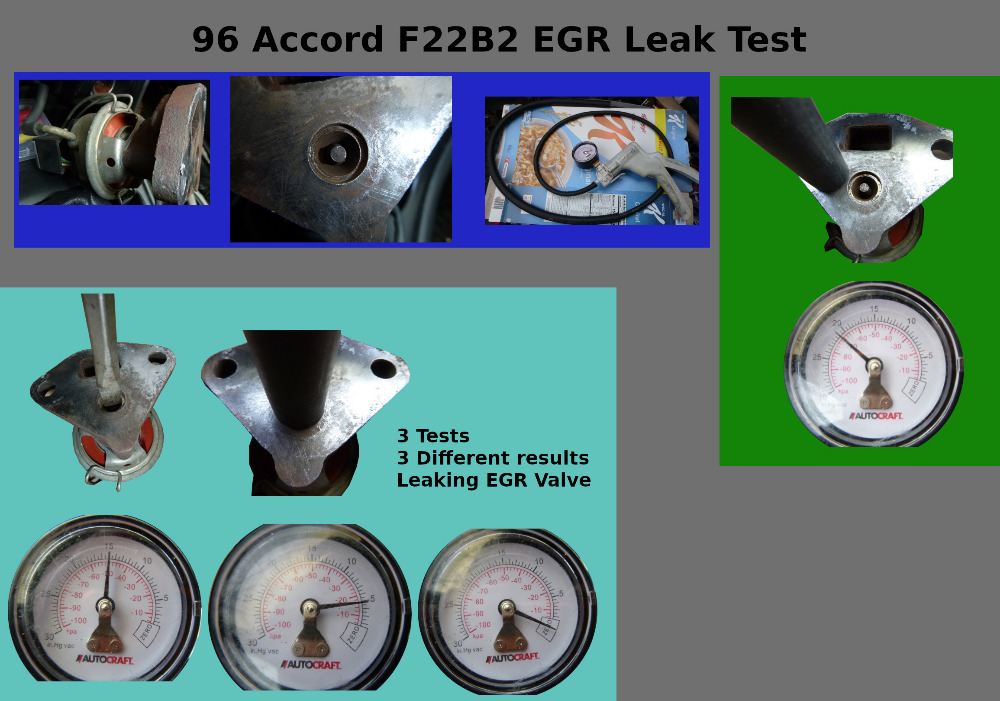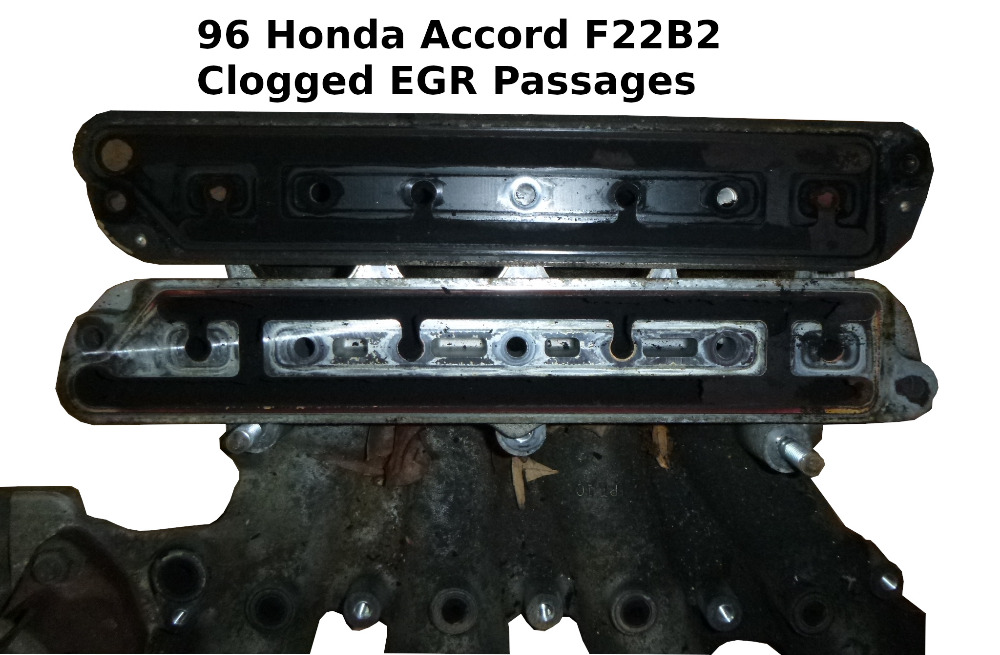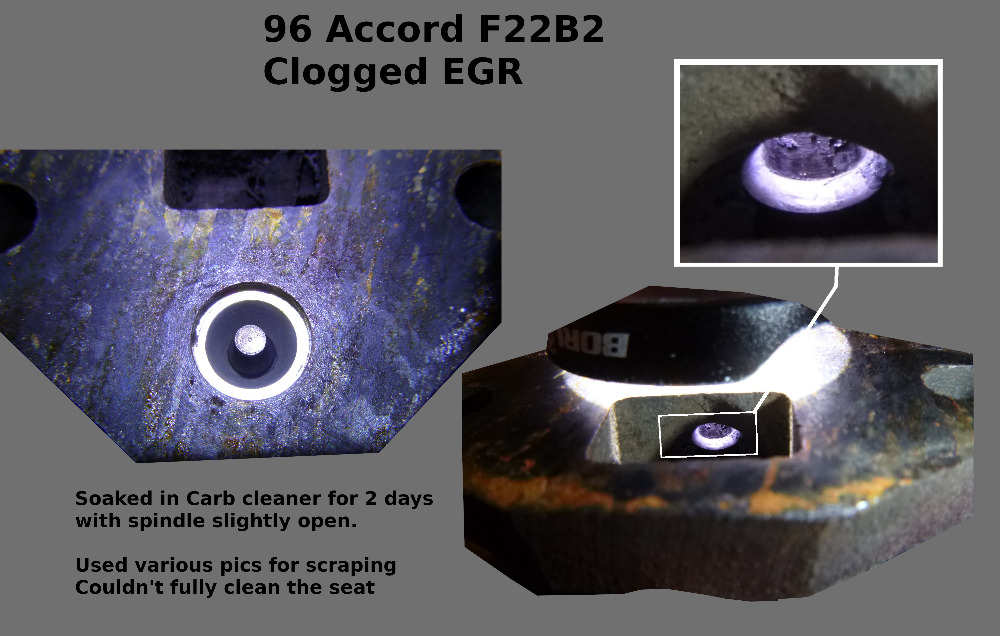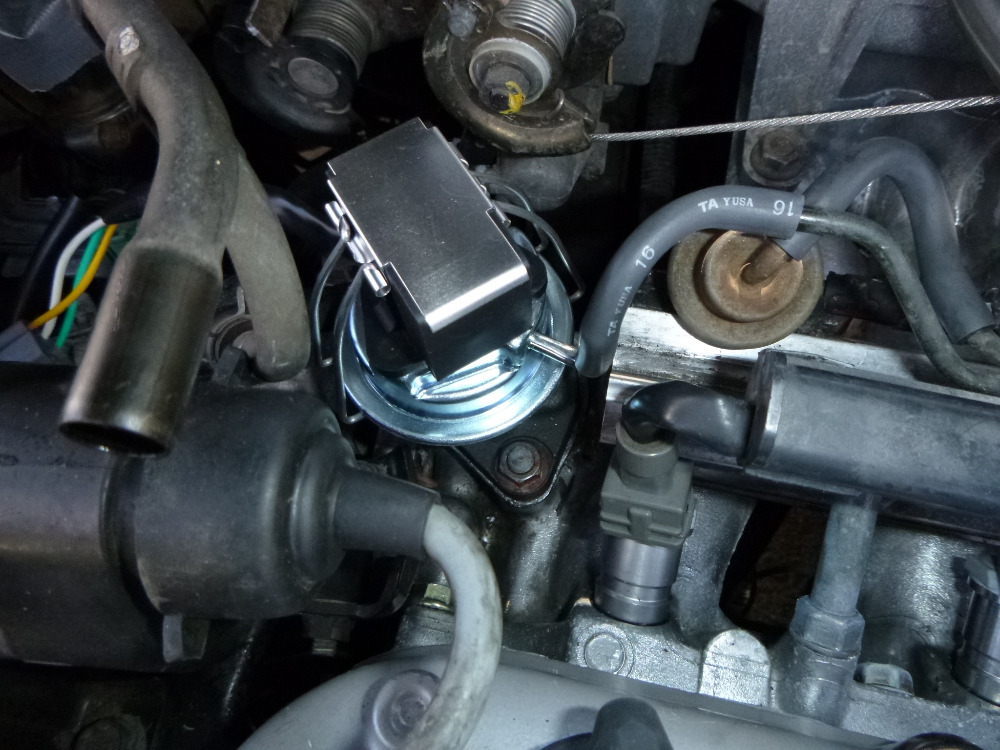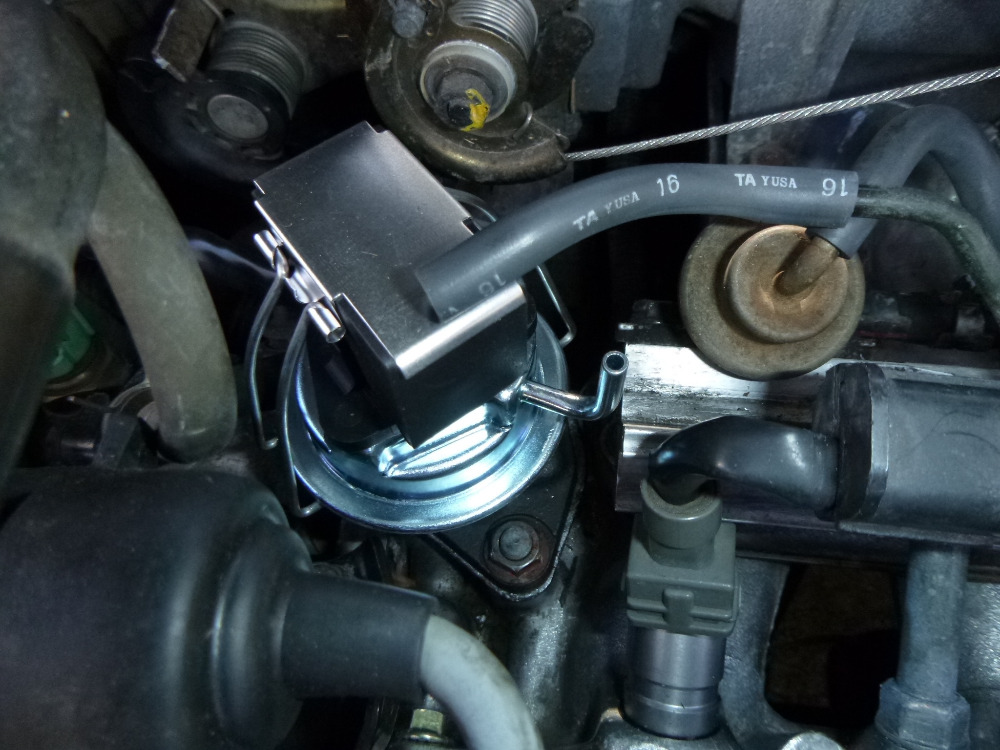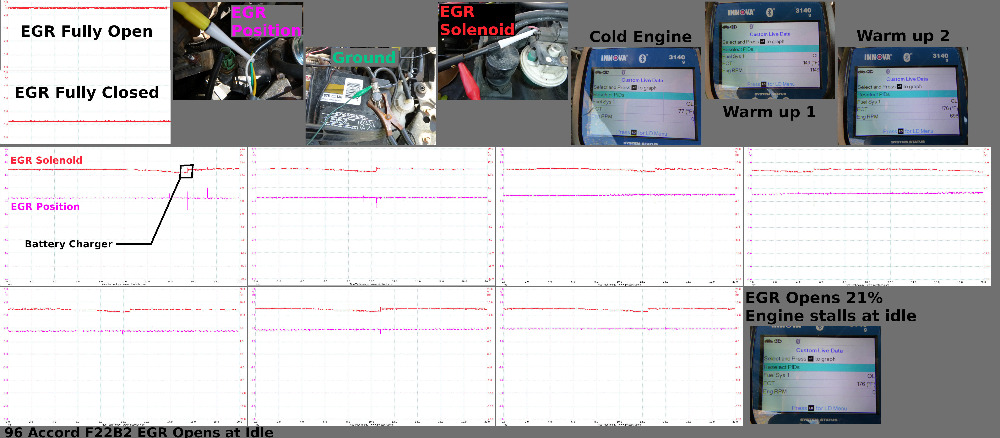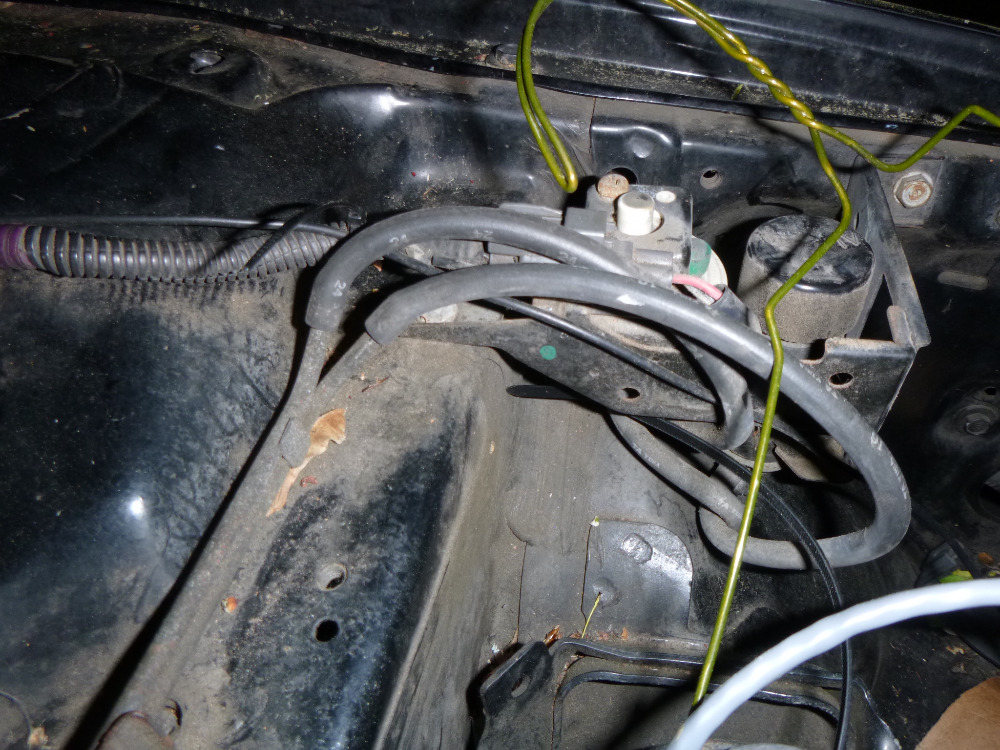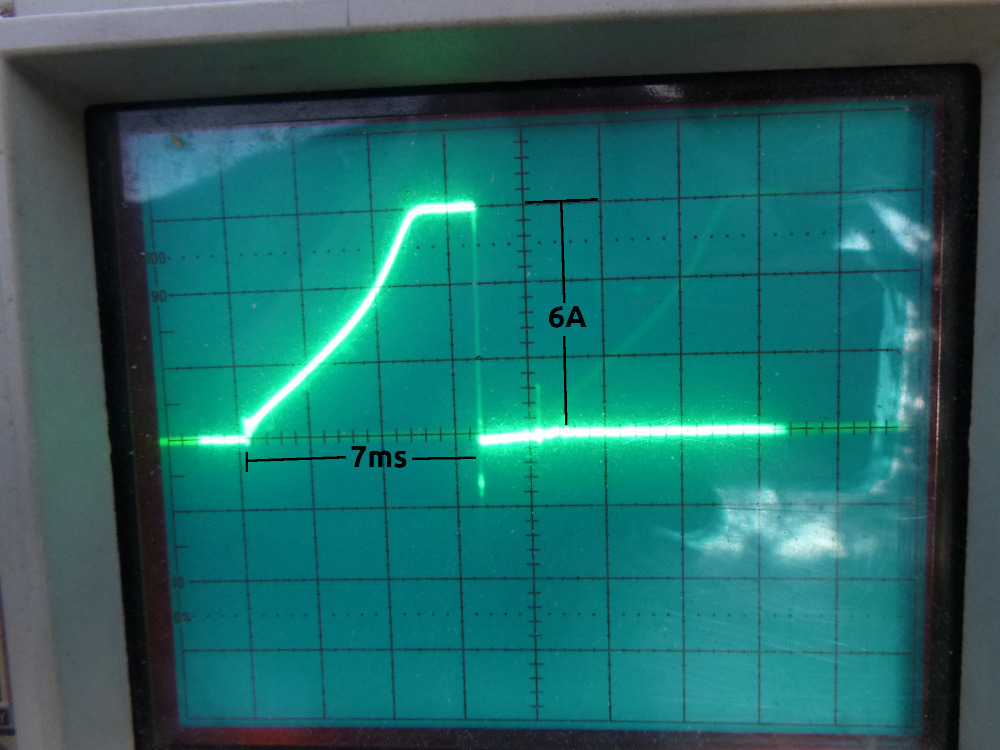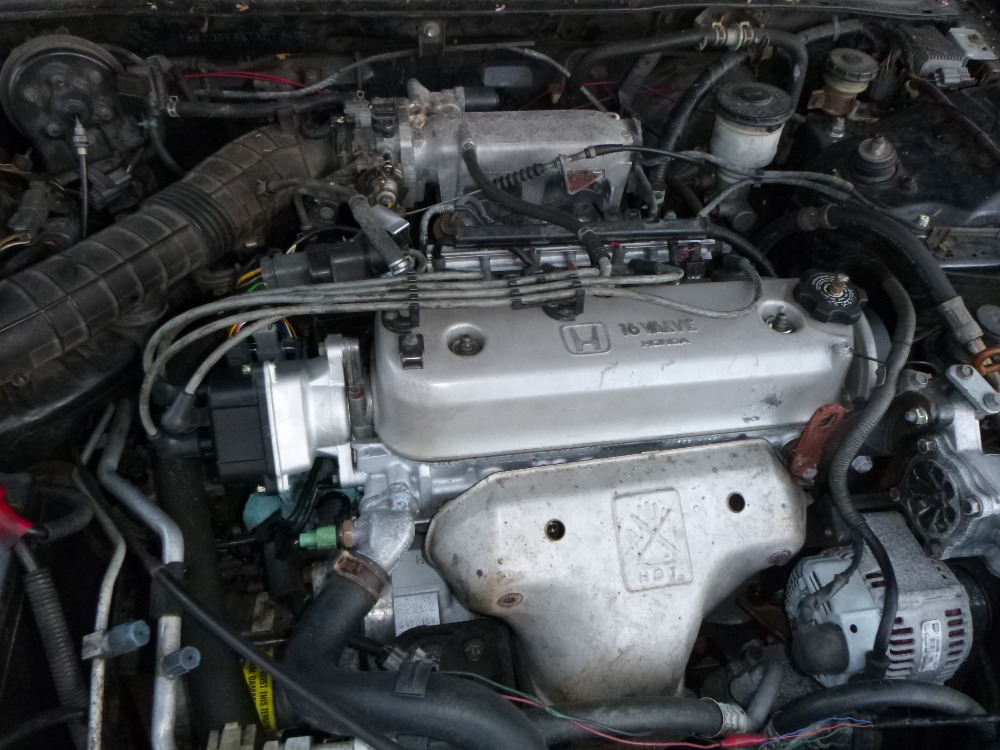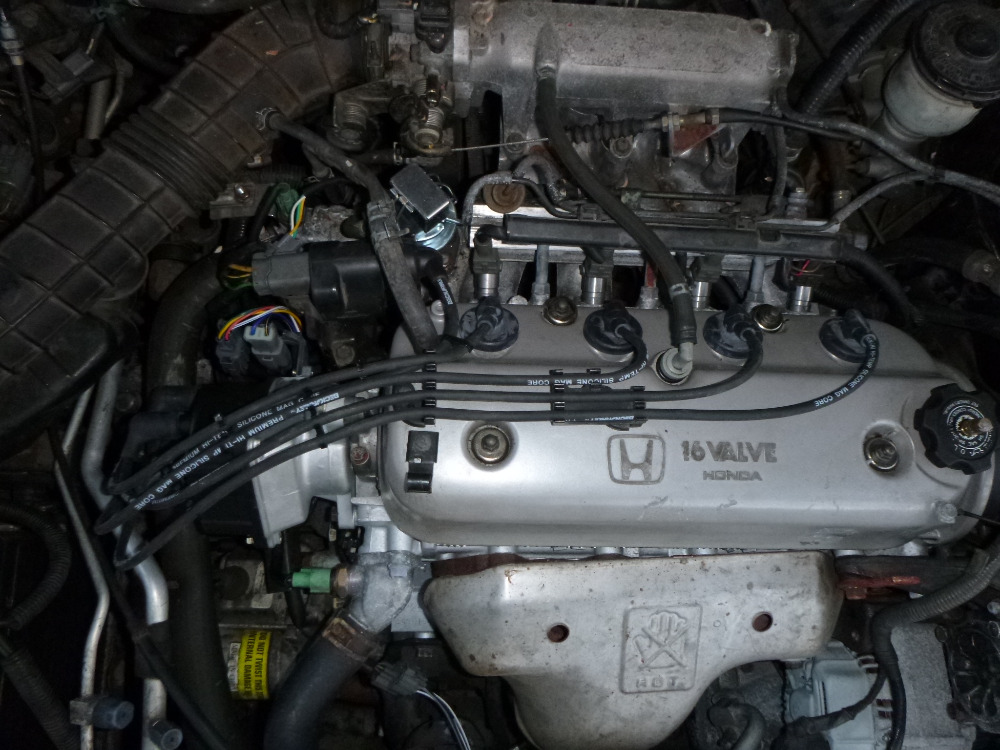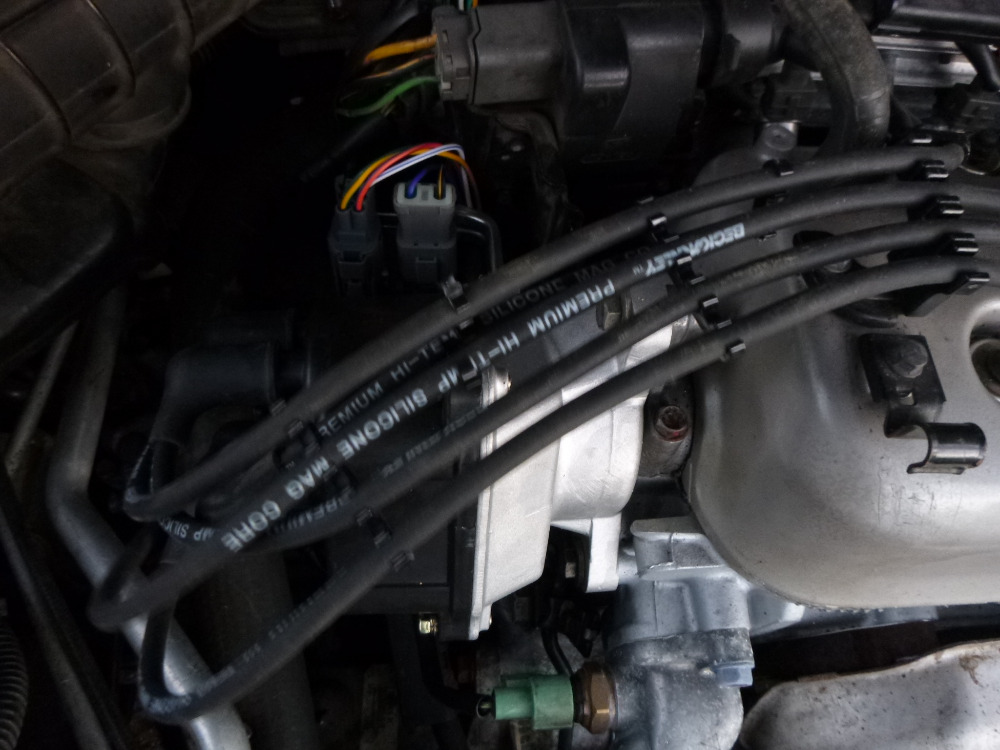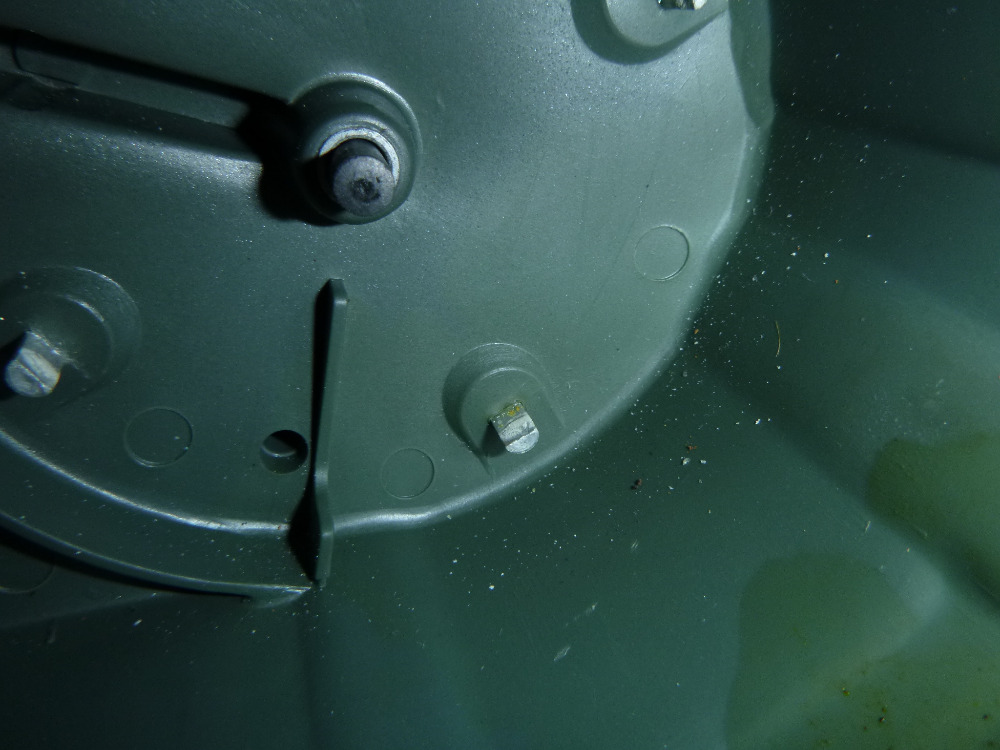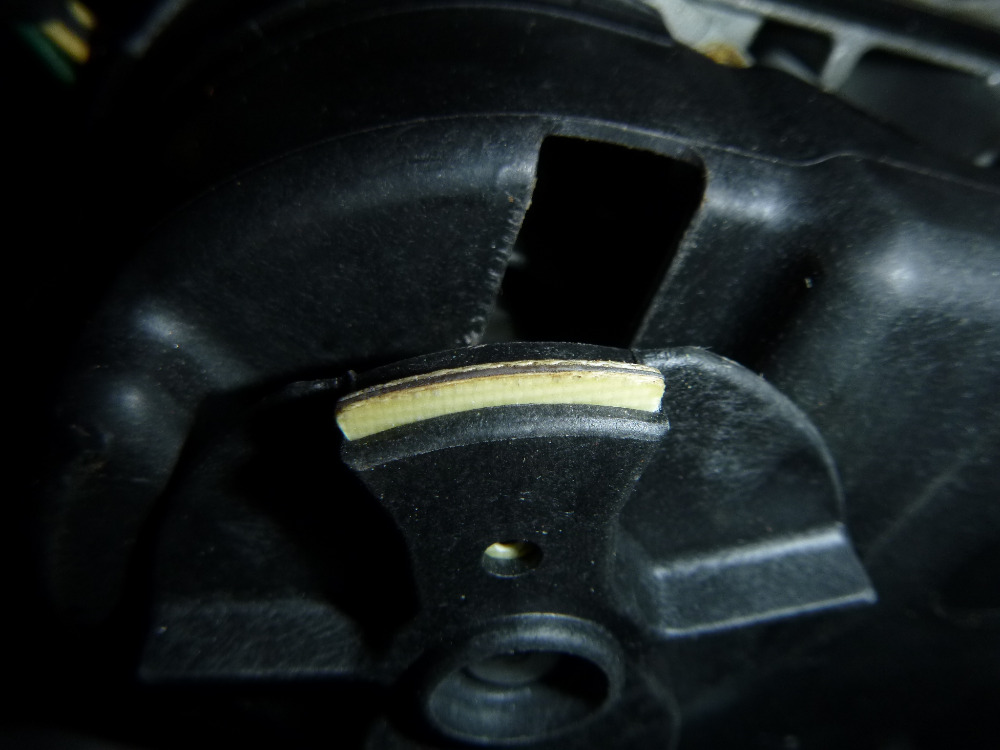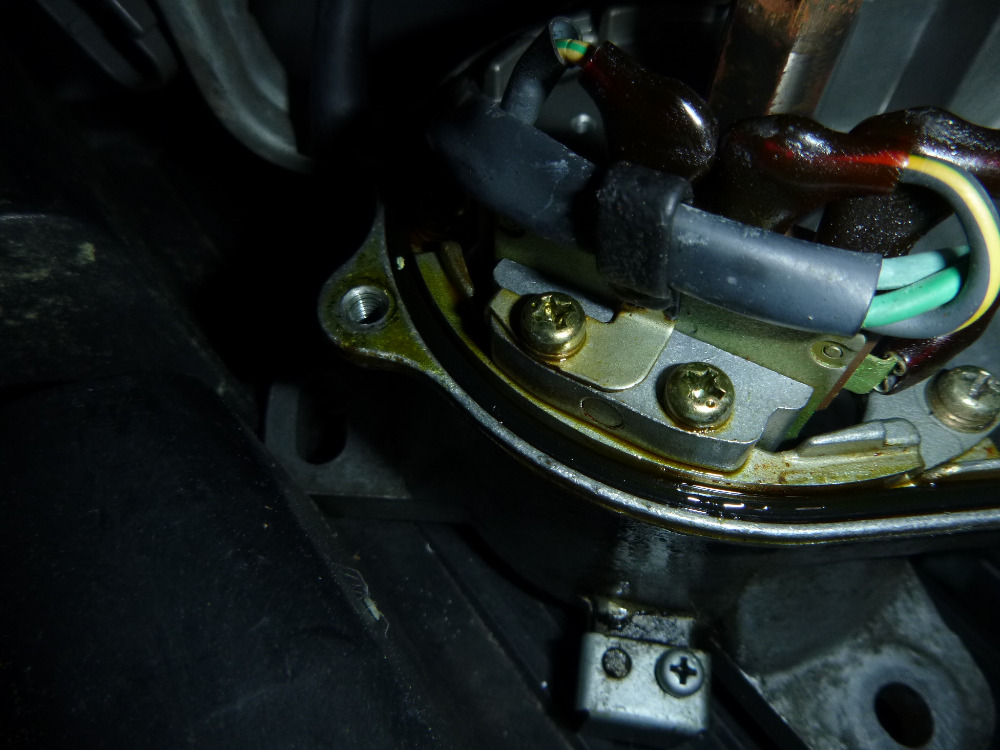96 Honda Accord 5 speed (F22B2 engine), mysterious misfire
- guafa
-
- Offline
- Platinum Member
-

- Posts: 477
- Thank you received: 80
You mentioned fuel STFT are bouncing from -20% to 20%. Also in all cylinder and all engine rpm's.
*How about LTFT?
*Is the misfire happening at all fuel trim range? I mean, have you matched misfire with lean or rich condition?
I'm still not good at diagnosing with secondary waveforms, then i can't talk about these. For me, everything look good.
Please Log in or Create an account to join the conversation.
- hakachukai
-
Topic Author
- Offline
- Premium Member
-

- Posts: 84
- Thank you received: 28
I'm currently not able to drive the car ( though that may change in the coming days ).
Previously the fuel trims were swinging between -20 and +20%. Now they swing roughly between +6% and -27%.
Since the EGR bypass, the fuel trims have become a lot more predictable. However they sill have a serious problem.
At idle they aren't too bad ( I don't have an exact number yet ).
As I rev the engine up the fuel trims go more and more negative. At 3k rpms's the STFT is -27%.
I did a quick experiment and tried disconnecting all of the PCV lines ( because the engine is a fresh rebuild and not broken in yet. It has a LOT of blowby ).
I did the same test and it seemed to help a little. At 3k rpm's the STFT was more like -20%
I would take that with a grain of salt for now. I need to do more testing to get solid figures. The first thing that I'm going to do is make sure that EGR valve isn't leaking or sticking so that I can get my idle situation fixed.
The engine does shake a bit at lower rpms and smooths out as rpms increase. I'm not sure if it is a misfire or not.
I can think of 4 things that could be causing it:
1. The balance shafts are slightly out of time ( doesn't seem likely because of the amount of time and effort I put into making sure it was correct )
2. Misfire ( could be, but if it is it's constant and minor at low rpms)
3. Worm motor mounts ( probable. They are OLD )
4. It could just be the nature of this engine ( Don't know about this one )
Once the EGR situation is fixed I'll post facts, figures and measurements related to the fuel trim situation.
Please Log in or Create an account to join the conversation.
- Noah
-

- Offline
- Moderator
-

- Give code definitions with numbers!
- Posts: 4901
- Thank you received: 1092
It really messes up the flow when people edit our their mistakes in an attempt to save face.
"Ground cannot be checked with a 10mm socket"
Please Log in or Create an account to join the conversation.
- hakachukai
-
Topic Author
- Offline
- Premium Member
-

- Posts: 84
- Thank you received: 28
It's always a risk not editing out the mistakes. Some people appreciate it, some people hate it and give you grief over it. Thanks for being one of the people that appreciate it!
My goal here is to help everyone else learn as much as they can from my situation as I learn myself, especially because I believe that this scenario is somewhat unique. It's definitely not your average Google search result
Please Log in or Create an account to join the conversation.
- hakachukai
-
Topic Author
- Offline
- Premium Member
-

- Posts: 84
- Thank you received: 28
Hopefully I can maybe clean the valve seat and get good results. If not I'll have to replace it.
You maybe wondering ( because I have said a few times )... how could the car have ran perfectly before the rebuild if this EGR valve was leaking the whole time?
I'm glad that you asked vicariously through me!
Let me show you the answer:
I cleaned every part of the intake completely spotless when I re-assembled the engine. That caused the leaky EGR valve to actually matter.
Please Log in or Create an account to join the conversation.
- guafa
-
- Offline
- Platinum Member
-

- Posts: 477
- Thank you received: 80
Does these engines have MAF?
Have you cleaned/tested it?
Please Log in or Create an account to join the conversation.
- hakachukai
-
Topic Author
- Offline
- Premium Member
-

- Posts: 84
- Thank you received: 28
I doubt that it is un-metered air flow for 4 reasons:
1. The MAP seems accurate and compares well against my 99 civic
2. Un-metered air flow would cause +fuel trims, rather than -
3. I sprayed 2 whole cans of carb cleaner ALL OVER this engine while it was idling looking for air leaks. I couldn't find a single one.
4. I spent a huge amount of time and effort making sure that everything is spotless and doesn't leak.
Is it impossible? No, definitely not.
Time will tell. If there is an air leak some where I'll eventually find it.
Currently I'm focused on cleaning the EGR valve. The weather is shutting me out again... so I might not be able to accomplish much until it gets better.
Please Log in or Create an account to join the conversation.
- guafa
-
- Offline
- Platinum Member
-

- Posts: 477
- Thank you received: 80
1. - fuel trims means pcm is subtracting fuel from "ideal" air/fuel ratio.
2. Pcm subtracts fuel because by "watching" 02 sensor, is detecting too low air (which could be also too much fuel)
3. Too much fuel could be due to.
*Leaking injectors (which are new in this case)
*Another source of fuel (contaminated oil, fuel vapours from canister)
*ECT sensor out of range.
4. In speed density engines, unmetered air could be caused by
* Map sensor out of range.
* Noisy Map sensor ground (which increase average voltage output and tells pcm there is less vacuum than actually is), increasing pulse width.
* IAT sensor out of range, which tells pcm air is colder than actually is, increasing pulse width.
Please Log in or Create an account to join the conversation.
- hakachukai
-
Topic Author
- Offline
- Premium Member
-

- Posts: 84
- Thank you received: 28
I will check all of those things when the weather allows.
I just picked up some carb cleaner for an attempt at cleaning the old EGR valve.
If that fails I'll pick up a replacement tomorrow
Please Log in or Create an account to join the conversation.
- hakachukai
-
Topic Author
- Offline
- Premium Member
-

- Posts: 84
- Thank you received: 28
Here is the update:
I tried my best to clean the old EGR valve, but no matter why I tried I could never get the valve seat fully clean.
I soaked in carb cleaner for 2 days straight with the spindle slightly open and picked it with various small picks.
I also tried spraying it with carb cleaner and slamming the valve shut multiple times. I was never able to get it to seal.
(in case you are wondering, the rust is from this part sitting outside for a few days after I gave up on it )
So I replaced it:
After that the car idled fine, but still has other issues. I still hear and feel occasional misfires, fuel trims still seem way off and possible spark timing, but I'm not 100% sure.
In the middle of my test the car suddenly died after being revved up a bit, then going back down to idle. I suspected the EGR valve again.
so I jumped out and pulled the vacuum hose on the EGR just to check.
Sure enough!
As soon as I pulled the hose I heard it suck in a bunch of air.
For some reason either:
- the ECU decided to open the EGR valve and keep it open
- there was a malfunction of the EGR electrical circuit
- The vacuum solenoid leaked vacuum into the EGR valve
- The ECU correctly opened the EGR valve but failed to shut it
I'll check it out more when it's a lot less freezing cold outside.
I'm also working out a situation where I can test drive it and record data during the test drive.
That way we'll have something more concrete to look at.
One random question:
Is it normal for spark advance to be 39 deg BTDC at only 1500 RPM with the car in neutral?
That seems like a lot of spark advance for not much RPM increase... but I don't know what is normal for these engines.
Please Log in or Create an account to join the conversation.
- hakachukai
-
Topic Author
- Offline
- Premium Member
-

- Posts: 84
- Thank you received: 28
Today I tested the EGR valve in detail and found that it is indeed being opened when it should not be.
The ECU is not opening it ( no signal sent ). Something must be going on with one of the vacuum components.
Based on the timing of when it opens, it makes me wonder if the fast idle thermo valve is somehow involved.
Here are the findings:
The image above is completely unreadable using the javascript viewer, so I'll just hit the highlights:
Cold engine: 77DegF
Warm up 1: 149DegF 1149 RPM
Warm up 2: 176DegF 698 RPM
Warm up 3: 176DegF 0 RPM -- EGR valve opens 21% engine dies at idle.
Min EGR position voltage 1.2v
Max EGR position voltage 4.5v
EGR voltage at stall 2.0v -- Rise time 80msec
No EGR solenoid signal is ever sent
EGR vacuum remains even after the engine dies.
It still idles rough hesitates and misfires even before the EGR opens.
At this point I'm going to bypass the EGR for diagnostic purposes. I'll fix all of the underlying issues, then I'll repair the EGR last.
Please Log in or Create an account to join the conversation.
- hakachukai
-
Topic Author
- Offline
- Premium Member
-

- Posts: 84
- Thank you received: 28
These two vacuum hoses that both go to the EGR solenoid got switched.
At first it would seem like that wouldn't even matter, except that the EGR controls have 2 parts:
A. The vacuum reducer / regulator
B. The EGR solenoid
The supply vacuum is supposed to go through the vacuum reducer first, then the reduced level of vacuum goes through the ERG solenoid, which passes that vacuum on to the EGR valve when the ECU activates the solenoid.
Since the hose accidentally got reversed, supply vacuum was first going through the solenoid, then it was going through the vacuum reducer / regulator backward. I guess the vacuum must have been high enough when the thermo valve shut ( at 176DegF ) to either bypass or pull the EGR solenoid shut. Maybe the vacuum reducer / regulator also acts as a check valve is you use it backward?
Anyway, This is how those two vacuum lines are supposed to be. They were reversed before:
Vacuum lines 16 and 24
Now I'm down to an engine that does run and idle but runs rough.
Fuel trims seen good at idle ( with the PCV disconnected )
Fuel trims go more negative as RPMs increase.
Will investigate that further
For those who are wondering, the coat hanger is holding my DIY cam optical sensor.
Please Log in or Create an account to join the conversation.
- hakachukai
-
Topic Author
- Offline
- Premium Member
-

- Posts: 84
- Thank you received: 28
A lot of progress has been made and there were several "interesting" situations that made diagnosing this MUCH harder than it needed to be.
They were:
- The Tacometer was lying! It was telling me that it was idling at 1250rpm when in fact it was idling at 750rpm ( exactly like it should )
- The EGR vacuum lines got switched in a way that caused the EGR valve to slowly open as the engine warmed up. just about the time the engine would warm up to 190F or so, the EGR would valve would open 20% and stall the engine. If I kept it alive by using throttle the fuel trims were ALL over the place!
- It had a misfire on all cylinders. After checking and investigating all of the sensor inputs ( which seems normal and made sense ) I replaced the distro. That made a BIG difference!
So now I'm to the point where it starts and runs fine. The fuel trims are at 0.00% at idle. Sometimes they go up or down a bit ( as much as 8% ) as I play with the revs and different throttle positions. But it always comes back to 0.00% at idle.
Almost all of the time it idles perfect, but sometimes if I punch the throttle and drop it, it will idle a bit low at 500rpm, then come back up to 750rpm several seconds later.
I also notice that the engine occasionally stumbles a tiny bit. I'm not even sure that I would call it a misfire. Occasionally the sound of the engine changes slightly. With a timing light I can see the ignition timing suddenly advance somewhere between 3deg and 5deg for a fraction of a second, then it goes back to normal when this happens
The biggest issue I have right now is that the engine vibrates a lot at idle. No bad noises. It runs pretty well. It just vibrates a LOT. Did I maybe somehow mess up the timing of the balance shafts? I hope not. I put a large amount of effort and study into getting them right.
Here is the Primary charge ramp BEFORE I replaced the distro. ( I'll measure it again soon with the new distro to check fro differences )
Just replacing the distro was enough to solve the misfire
but after that I replaced the plug wires too.
This pic shows the new spark plug wires vibrating ( to give you an idea of how much the engine vibrates ). I'd say the spark wire move +,- 1mm just from the vibration at idle
The rest of the pics are a quick autopsy on the old distro. I'm not 100% sure why the cap terminals were so corroded, but I do know that it was leaking oil internally. The center shaft had surface rust on it and the wires were so crispy that I couldn't even get it fully apart with risking snapping the wires off.
Please Log in or Create an account to join the conversation.
- hakachukai
-
Topic Author
- Offline
- Premium Member
-

- Posts: 84
- Thank you received: 28

So I'm still tracking down a misfire in this car! It's now my daily driver. A lot happened since I last posted. I have replaced several parts all related to the misfire. None of those parts replacements solved the misfire completely, but each one made it run a little bit better ( misfire less ).
- I replaced the Distro, plugs and wires ( ran a little bit better )
- I replaced the ignition coil ( ran a little bit better )
- I replaced the O2 sensor [ which I confirmed was slow to respond ] ( ran a little bit better )
- I replaced the alternator which was causing an ignition related code. I confirmed that the alternator was generating dirty power [ too much power fluctuation ] ( the code went away and it ran a little bit better )
However... there is still a slight misfire that is haunting me.
The fuel trims swing both high and low at different times.
At idle STFT is sometimes perfect [ 0.0% ]
Other times at Idle it swings between +10% and -10%
I have no idea what is causing this. The only thing left that I have not checked is the Baro sensor. Apparently my ECU has one built into it.
How do I check the Baro sensor to see if it's reporting the correct altitude?
I looked it up in an FSM that I have but the instructions mention unplugging the TCM ( which I don't even have ) and measuring some pins on the main wiring harness but NOT the ECU. It also gives no voltage levels to check for.
I'm guessing that much like the MAP sensor, it has a certain voltage to pressure curve? How do I properly measure that?
Please Log in or Create an account to join the conversation.
- brendon.kerr
-
- Offline
- New Member
-

- Posts: 3
- Thank you received: 0
And an injector balance test?
Please Log in or Create an account to join the conversation.
- hakachukai
-
Topic Author
- Offline
- Premium Member
-

- Posts: 84
- Thank you received: 28
I pulled all 4 injectors and checked the flow. The streams all visually looked identical, were healthy, powerful and were made up of super fine droplets. No leaking or heavy droplets detected. I did not specifically measure the flow rate of each one during cranking conditions. I can tell you that these are new injectors. I still have the original OEM set. They perform identically. I previously checked the resistance of each injector. They are in spec.
Of the dozens of tests that I've done on this engine, this is the only one that currently shows me a failing result:
Using a timing light on Spark plug #1, when it misfires I momentarily see the spark timing jump way out of place. Most of the time ( at idle ) it's right where it should be ( 10 to 15 Deg BTDC ). I get the same result on all 4 cylinders ( the occasional jumping, obviously they all have different base timings ).
Additionally, I see the fuel trims swinging wildly at times in both directions under all conditions. Sometimes they are perfect.
Here is a brief list of tests that I have done:
System voltage tests
Alternator voltage tests ( this lead to alternator replacement )
02 Sensor tests ( this lead to replacing a slow to respond O2 sensor )
TPS tests ( the signal is smooth and does not jump around )
Map Sensor tests ( the signal is smooth, continuous and is accurate [ according the FSM values ] )
Coolant temp and IAT sensors seem reasonable ( checked with a scan tool. Their values are logical and make sense )
Crank sensor and TDC / CYP / CKP sensors. Their signals all look reasonable and don't drop out. ( I believe I already posted a diagram on this... not 100% sure ).
Always starts, always runs.
The engine idles right at 750 rpm's like it should
Spark plug gaps are right on the money
Reading the spark plugs indicates it's running a bit rich
No spark leaks can be found ( I checked multiple times )
Engine vacuum at idle indicates a healthy engine ( in the green zone of my vacuum gauge )
I've checked the timing belt settings about 10 times. It's right on the money.
I've checked the primary ignition ramp ( posted about that ). It's right on the money and I don't see any dropouts
I've checked everywhere imaginable for air leaks. I can't find a single one ( no hissing and spraying carb cleaner everywhere does not even change the fuel trim ).
Compression is perfect on all cylinders
oil is clean an uncontaminated
coolant is clean an uncontaminated
Fuel has been checked. No water detected. Running 87 octane ( as designed ). No fuel additives.
Injector spray patterns look good and are all identical ( checked during cranking )
Cylinder drop tests reveal nothing. Every cylinder is identical.
No codes are set
End result:
Always starts, always runs.
It idles and misfires a little bit.
There is a bit of valve ticking at start up, but it goes away as the engine warms up ( pretty sure that's by design ) [ I set the valve clearance to spec ].
When it first starts I can definitely smell fuel coming out the tail pipe ( especially when it's cold ). It goes away when the engine warms up.
It's a little bit sluggish ( but not too bad ) up until about 3,000 rpms. Once it hits 3,000 rpms it takes off like a rocket ( you can feel the power kick in ).
This is the nature of the misfire:
It never back fires or fore-fires.
The engine never dies, revs or acts radically in any way.
It simply stumbles a bit. You can feel a bit of extra dull rumbling in the engine along with some power loss. It feels to me like maybe it's running too rich.
This usually happens more under load ( though it happens at idle too ).
However above 3,000 rpms I don't notice it at all. Once you hit 3k the power output about doubles. You can feel it kick in like a turbo.
The one and only sensor that I have not checked is the Baro sensor that is installed inside the ECM ( because I don't know how ).
Can someone help me out with that?
Right now my only theory is that maybe the Baro sensor thinks that I'm at Sea level ( so it adds more fuel ). Then the O2 sensor sees that it's too rich and backs way off. Then they sit there and fight each other dueling banjo style. If it's not this... then I genuinely have no idea what is wrong with this engine O_o
Please Log in or Create an account to join the conversation.

